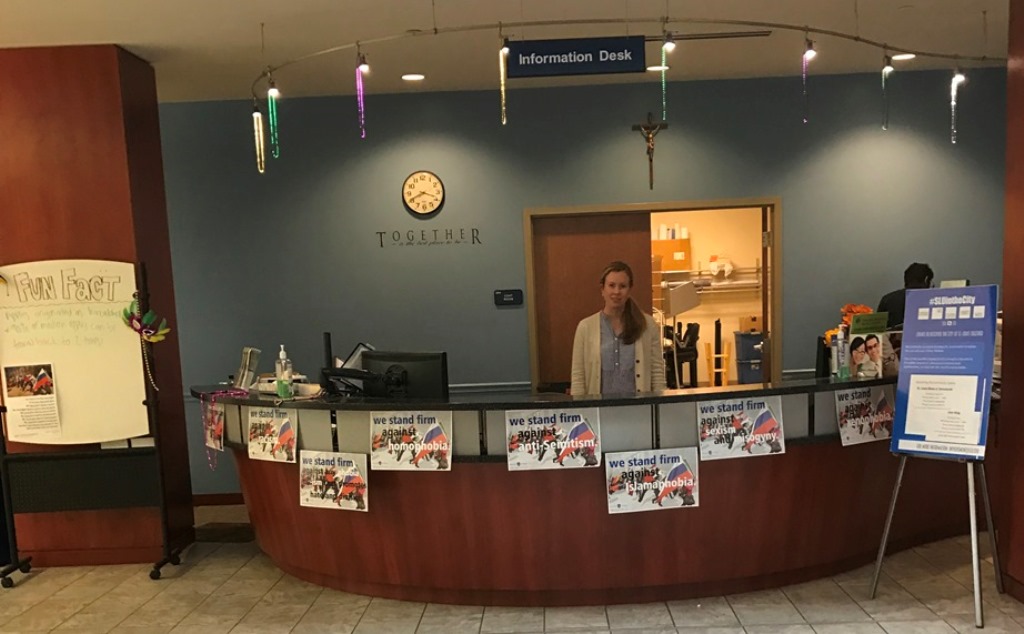Visual and Performing Arts, Office of Diversity and Community Engagement Offer Positive Poster Campaign
At Saint Louis University, art does more than imitate life: It proactively responds to life, often engaging in controversy and sometimes uncomfortable aspects of it.
Most recently, members of the Visual and Performing Arts collaborated with the Office of Diversity and Community Engagement to create posters and cards that express the essence of the Open Letter SLU community members signed last November in an effort to foster community and reflect SLU’s values and mission. The poster and card campaign illustrates a message of solidarity against hate speech and prejudice.
To offer further more information regarding the campaign, Newslink posed questions to Jonathan Smith, Ph.D., vice president for diversity and community engagement, and Laura Franklin, Ph.D., professor of music and department chair for fine and performing arts.
NL: What started this campaign?
JS: This campaign came about through a set of collaborative discussions between the Fine & Performing Arts Department and the Office of Diversity and Community Engagement. Independently, we had become concerned with the fact that uncivil and hateful voices have come to occupy too much space in public discourse. Our aim was to be proactive. Instead of waiting for some unwanted voice to fill up the space, we decided (again, independently) to develop messaging that articulated our community values and to distribute that as far and wide as possible. Some faculty members in VPA came up with the concept for the cards and posters. They use language from the open letter that more than 1,000 members of our community have signed.
NL: Dr. Smith articulated the roots of the campaign. Would you please describe the role that the fine and performing arts play in addressing issues of uncivility and hateful posturing in this instance and others?
LF: The arts are a natural connection point for almost everyone, and so they can be a powerful tool for creating empathy and for facilitating conversation among those who may be different from one another in some way. For centuries, works of art have been created with the specific intention of reinforcing values, communicating messages or generating discussion. In this case, the message is one of justice, acceptance, respect and honoring the inherent dignity of ALL people.
NL: Specifically, what went into creating the posters and cards?
LF: Two VPA staff members, Rick Dunn and Meme Wolff, looked for images and text that reinforced the message we wished to convey. The first poster they created - the one with the longer text - contains an image from Atlas Week and an excerpt from the letter signed by members of the SLU community. I sent that to Jonathan to make sure we were on the same page. At his urging, Rick and Meme then created a series of eight posters – each with a modified Atlas Week image, and one line from the same letter. To complete the campaign, we decided to create postcards containing the final lines of the letter on one side, and the modified Atlas Week image on the other. Once they were all approved, we took the final versions to print. In total, there are 450 posters - 50 of each of the nine versions - and 4,000 postcards.
NL: What is the goal of the campaign?
JS: Speak positively, firmly, and proactively for our values.
NL: The entire series of posters is displayed at the Information Desk at Busch Student Center. Can anyone get these? Where they are available?
JS: Anyone can get them. We have them in the Office of Diversity and Community Engagement, 201 DuBourg Hall.
NL: How long will the posters be available?
JS: Right now, we don’t have an end date in sight. We have 450 posters and four thousand cards, but that doesn’t mean that we end this campaign once this batch is distributed and posted.
NL: Is this connected to Atlas Week? The Clock Tower Accords? SLU’s mission overall?
LF: It is a part of our overall mission…
JS: I think it’s important to see it as overall mission. At the same time, it’s important to see it as an important part of creating and maintaining a climate in which implementation of the Accords, Atlas Week programming, and any number of other campus events happen in a space that is civil.


















